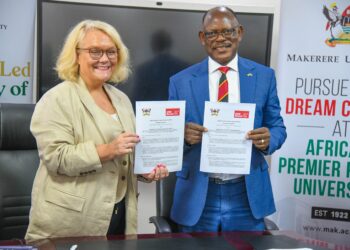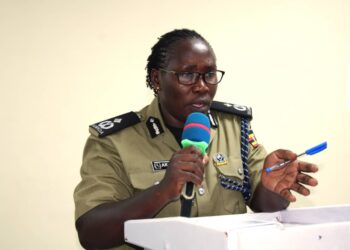The Constitutional Court has ruled that trying civilians for criminal offences in Military Courts of Uganda People’s Defence Forces (UPDF) is unconstitutional.
The petition to ban military courts from trying civilians was reached at a ratio of 3 to 2 from the total of five Judges (Coram) and these included; Deputy Chief Justice Richard Buteera, Constitutional Court Judges (CCJ); Justice Kenneth Kakuru, Justice Geoffrey Kiryabwire, Lady Justice Elizabeth Musoke and Lady Justice Monica K. Mugenyi.
Deputy Chief Justice Buteera and Lady Justice Monica K. Mugenyi ruled in support of dismissing it while Justice Kenneth Kakuru, Justice Geoffrey Kiryabwire and Lady Justice Elizabeth Musoke allowed the petition to be upheld.
The ruling arises from the petition to the Constitutional Court by Rtd Capt Amon Byarugaba, Hasibu Kasita, Mathias Rugira and 167 others challenging the unconstitutional exercise of jurisdiction by Military Courts to try civilians for criminal offences.
The petitioners also alleged that the nature of trial proceedings in Military Courts do not ensure the accused civilian persons charged before those courts, the several minimum fair trial safeguards guaranteed under the 1995 Constitution which is also unconstitutional.
Case background
According to the petition, Mr Amon Byarugaba is stated to be a retired former captain in the former National Resistance Army (NRA), now Uganda Peoples Defence Forces (UPDF). In 2003, after he had retired from active military service, he was charged in the General Court Martial (GCM), a military Court.
Mr Hasibu Kasiita is stated to be a civilian, who in 2002 was charged in the GCM for the offence of murder. It is alleged that his trial took 9 years to be concluded after which he was convicted and sentenced to 10 years imprisonment. Mr Mathias Rugira is stated to be a civilian who was tried in the GCM for an unspecified offence.
The Petition is stated to also have been brought on behalf of 167 other petitioners. These 167 persons, who are unascertained in the Petition, are all stated to be civilians who have in the past been tried in the GCM.
The petitioners informed the court that Military Courts can be said to have jurisdiction to try civilians for criminal offences because there are several doubts as to whether Military Courts are capable of implementing the minimum fair trial guarantees required under the 1995 Constitution. For example, the petitioners allege that a Military Court is incapable of being the “independent and impartial court” for trying civilians envisaged under Article 28 (1).
They added that they recognize that certain provisions of the Uganda peoples Defence Force Act, 2005 C’UPDF Act’) give Military Court jurisdiction to try civilians for criminal offences in some instances. However, they allege that those provisions are unconstitutional. They alluded that the 1995 Constitution, in Article 209 thereof, spells out the functions of the UPDF, and those functions do not include trying civilians for criminal offences.
They contended that the most basic objective of the UPDF is to preserve and defend the sovereignty and territorial integrity of Uganda, which means that trying civilians is outside the constitutional mandate of the UPDF.
In their prayers, they demanded that Constitutional Court declares that military courts have no jurisdiction to try civilians for civil offences. That Military Courts are allowed only to try civilian if she/he aids and abets a person subject to military law in the commission of an offence [against national security] prescribed in the UPDF Act.
They also demanded that all civilians being tried for civil offences before military courts should be transferred to civil courts if the Director of Public Prosecution (DPP) is interested in pursuing criminal charges against those civilians.
They also asked that court that all civilians who were convicted by military courts for civil offences and are serving sentences should have their convictions set aside and the DPP if interested in pursuing criminal! charges against them may do so.
Ruling
While making her judgment on Thursday morning, Lady Justice Elizabeth Musoke, said that the framers of the 1995 constitution intended that, as a general rule, only the Courts spelt out under Article 129 (1) would be involved in the administration of justice for civilians. These courts are the supreme court, the court of Appeal, and the High court as superior courts of record.
“I declare that the exercise of jurisdiction by Military Courts to try civilians for criminal offences is unconstitutional. Under the 1995 Constitution, trying civilians is the role of civilian Courts of Judicature, which do not include Military Courts. Military Courts are intended as disciplinary Courts for the UPDF to serve the public interest of maintaining discipline among the members of the UPDF,” she said.
She also declared that the UPDF Act, of 2005, to the extent that it may be understood as conferring jurisdiction on Military Courts to try civilians is unconstitutional and therefore null and void to that extent.
“For that matter, I would order that criminal cases in which civilians have been charged before the Military Courts but are pending trial, or have been partly tried, should immediately be transferred to a competent civilian Court of Judicature, and taken over by the Director of public prosecutions,” she said.
She added, “I would order that the convictions and sentences of civilians which arose from criminal cases tried by Military courts prior to the date of this Judgments are valid. However, in future, any trial of civilians by Military Coutts, and any decision that may be taken at such trials to convict and/or sentence civilians shall from the date of this judgment be invalid and null and void ab initio.”
Her ruling was vehemently seconded by Justices Kakuru and Kiryabwire.
However, lady justice Mugenyi in her ruling said “With tremendous respect, I am afraid I find no violation of that constitutional provision in the legally recognized trial in military courts of persons that have by their activities inadvertently subjected themselves to the jurisdiction thereof. I do not find a such trial to foster disharmony and misunderstanding between the defence forces and civilians, as seems to be the inference herein; neither do I find it to hamper the sovereignty and territorial integrity of Uganda. I would decline to grant the Declarations and Orders sought in the Petition.”
Her ruling was seconded by one Justice Buteera who said “I have also had the benefit of reading in draft the dissenting Judgment prepared by my learned sister, Mugenyi, JCC. I agree with her entirely and have nothing more useful to add. Since Kakuru and Kiryabwire, JJCC, agree with the lead judgment of Musoke, JCC, it is, therefore, the majority decision of this Court that the Petition is allowed. This Court makes the declarations and orders as set out in the judgment of Musoke, JCC.”
Do you have a story in your community or an opinion to share with us: Email us at editorial@watchdoguganda.com














